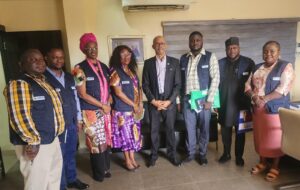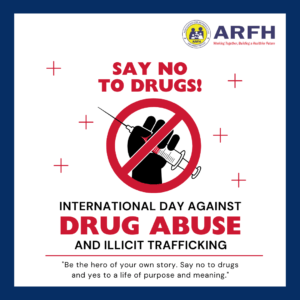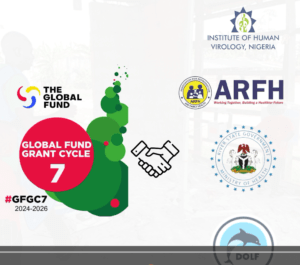The Association for Reproductive and Family Health (ARFH), in collaboration with the John Snow Inc. have launched two new projects.
The newly inaugurated projects are the Community-Oriented DMPA-SC Self Injection Acceleration in Nigeria (CODSAiN), and the Self-Care Accelerator Projects (S-CAP).
At the launch which took place on Tuesday, January 31, 2023 in Abuja, the Federal Capital Territory, ARFH also seized the opportunity to elucidate the success story of the of Resilient Accelerated Scale-up of DMPA-SC Self Injection in Nigeria (RASuDiN) project.
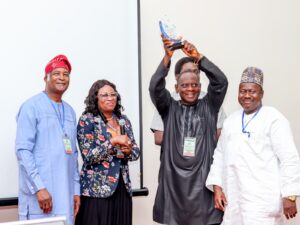
The well-attended event had in attendance the representatives of the World Health Organization (WHO), Federal Ministry of Health (FMOH), National Population Commission (NPC), National Primary Health Care Development Agency (NPHCDA), Executive Secretaries of State Primary Health Care Agencies, Permanent Secretaries of the ministries of health of various states, Family Planning Coordinators from various states, Representatives from Centre for Communication and Social Impact (CCSI), Society for Family Health (SFH), Marie Stopes, as well as other stakeholders and friends of ARFH and JSI Inc.
The event provided a platform for ARFH and JSI to launch new projects and present the overview and project strategies to the different stakeholders, thereby soliciting the support of stakeholders and provision of enabling environment in the states where these projects are to be implemented.
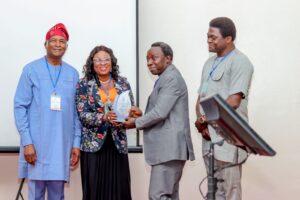
It was also an avenue to present the findings of the RASuDiN project in the ten (10) states (Anambra, Enugu, Delta, Oyo, Kwara, Rivers, Lagos, Niger, Plateau, and Ogun) where the project was implemented, while various states received awards in recognition of their immense contributions to the success of the project during the implementation.
To maximize the execution of the Community Oriented DMPA-SC/Self Injection Acceleration in Nigeria (CODSAiN) project, ARFH will draw on the high-impact and evidence-based outcomes documented on the RASuDiN project.
The CODSAiN project aims to close the gap in the unmet needs and missed opportunities for family planning through community scale-up of DMPA-SC and Self-Injection (SI) as a self-care measure and within the broader contraceptive method mix.
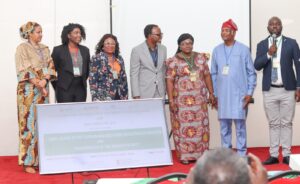
This will be accomplished through the project’s community-based distribution model, which aims to increase access to Hard-to-Reach (HTR) communities.
In four (4) additional target states—Gombe, Kano, Nasarawa, and Yobe—the project will scale up and speed up the roll-out of DMPA-SC and SI, while sustaining the successes of the RASuDiN project in four states—Enugu, Lagos, Niger, and Plateau.
These consolidated states will be supported to transition from the use of Community Resource Persons (CORPs) to the Government’s Community Health Influencers, Promoters and Services (CHIPS) programme, as well as achieve full sustainability at scale in all 164 LGAs of the eight (8) states.
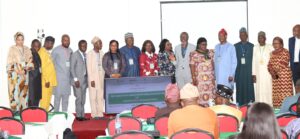
This project aligns with the strategy of the Federal Government’s FP 2030 goal of increasing modern contraceptive prevalence to 27% among women of reproductive age (WRA).
In his overview of the RASuDiN) Project, Senior Monitoring and Evaluation Officer at ARFH, Mr. Philip Oluwayemi, noted that ARFH has collaborated with the government and other strategic partners in designing and implementing innovative and high impact programmes for improved health and well-being of individuals and families in Africa, adding ARFH has key expertise in sexual and reproductive health and rights, including family planning.
The RASuDiN project was supported by the Bill and Melinda Gates Foundation (BMGF) and the Children Investment Fund Foundation (CIFF); and it was implemented by the ARFH, in collaboration with the Centre for Communication and Social Impact (CCSI).

The timeline of project implementation was five years, spanning 2018 to 2022; and the overall goal was to increase the use, acceptance, availability and accessibility of DMPA-SC/SI as part of FP methods within the broader contraceptive method mix among women of reproductive age in Nigeria.
In terms of service delivery, Oluwayemi revealed the new acceptors of DMPA-SC and SI, noting that they translated into 21% of new acceptors of all modern FP uptake (i.e. 1 in 5 women on contraceptives use DMPA-SC).
He stated that there has been consistent increase in DMPA-SC/SI uptake over the years, as DMPA-SC continues to be the a game-changer for contraceptive uptake through the optimization of self-injection as a means of self-care and autonomy for women of reproductive age.
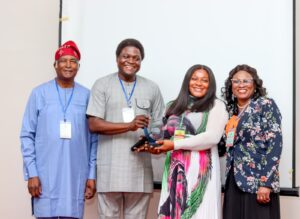
So far, 900,381 people have been reached with FP messages, with 67% referral completion rate (69% completed referrals with CORPs).
The ARFH trained over 676 CVs and 217 LGA Health Educators to generate demand for DMPA-SC.
The success facilitated data-driven decision making, as a review of the Year 2 data influenced the choice and frequency of DG activities in the different terrains, including in hard-to-reach areas. These activities boosted FP uptake in the implementation states as evidenced by the 28% increase in the numbers reached through social mobilization activities in the third year.
Professor A.E. Idyorough of the Department of Social Work, Federal University of Lafia, was the Principal Investigator for the End of Project Evaluation of the RASuDiN.
In a presentation at the Tuesday event, Prof. Idyorough said the use of contraceptives is crucial for reducing maternal morbidity and mortality by preventing untimely pregnancies and births as well as slowing unsustainable population growth.
He noted that though studies have shown that the contraceptive prevalence rate in Nigeria has continued to experience an exponential decrease due to the low uptake of various family planning methods, religion and culture are having lesser influence on families in their decision to take up family planning method.
Using data from DHIS2 as it relates to DMPA-SC product for the years 2020 to 2022 in the 10 states, Prof. Idyorough said it was found that the CPR of 2021 (ranged from 1.036 to 8.686 with an average of 3.643) and was 4 to 5 times that of 2020 (that ranged from 0.000 to 2.565 with an average of 0.845).
The CPR dropped in 2022 when the CPR for the 10 states ranged from 0.873 to 6.160 with an average of 2.819.
When this is compared with the national CPR for the 10 states which ranges from 5.9 to 23.7 with an average of 12.35, this implies that comparatively, DMPA-SC occupies 22.8% of the modern family planning methods.
This also suggests that the RASuDiN project made significant contributions to an increase in CPR in the project states; stating that majority (90.3%, n=428) of the respondents, including non-users, said the health facility staff was adequate.
They also rated the attitude of the health facility staff as satisfactory/highly satisfactory (92.4%, n=438) and that they were promptly attended to (94.1%, n=446).
In assessing the services, respondents rated the quality of counselling services as satisfactory/highly satisfactory (91.4%, n=433).
Also speaking at the event, Dr. Gabriel Otonga, who represented the Federal Ministry of Health, stated that the private sector channels have proved to be viable, as data indicates the private sector provides about 60% of family planning services, even among the poorest women in Nigeria.
According to him, the NPHCDA Health Facility Assessment 2019 shows that there are only 8,389 functional PHC facilities out of the 25,607, warning that “This is grossly inadequate and cannot meet the needs of all women of reproductive age in Nigeria.” He advocated the need to employ high impact strategies to rapidly scale-up the provision of RMNCAEH+N services.
Speaking on the Self-Care Accelerator Project (S-CAP), representative of the JSI, Ms Miranda Buba-Atare said Nigeria has an estimated population of 202 Million, projected to grow to 400 million by 2050.
She said there was limited access to health services through the conventional health system due to several barriers.
“These barriers have created an increasing demand for innovative strategies that will advance primary healthcare and contribute to universal health coverage,” she said.
Noting that Nigeria was one of the first countries to respond to the WHO Guideline on Self-Care Interventions for Health, she said that the development of the National Guideline on Self-Care for Sexual, Reproductive and Maternal Health was prioritized as a response to the COVID-19 pandemic.
She recommended strong stakeholder commitment to facilitate the continuation of provision of strategic direction for scale-up of self-care. She added that the purpose, goal and objectives of the S-CAP is to accelerate country-led progress towards achieving universal health coverage by promoting the use and scale-up of self-care interventions.
In her response, the CEO of ARFH, Dr. Kehinde Osinowo, thanked all stakeholders, while she also expressed her unalloyed confidence in the ability of every participating organizations to deliver on purpose.
She reiterated ARFHS commitment to the projects, emphasizing the organization’s capability in terms of human and material resources to ensure the success of any of its projects.

